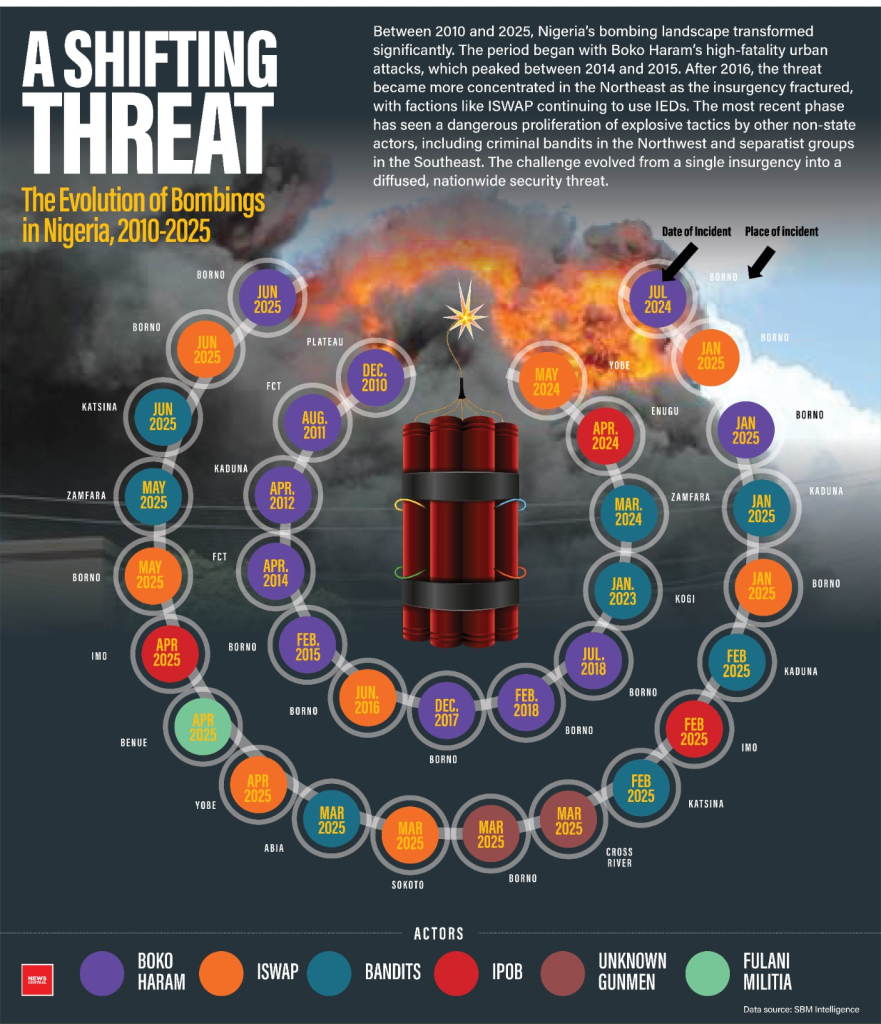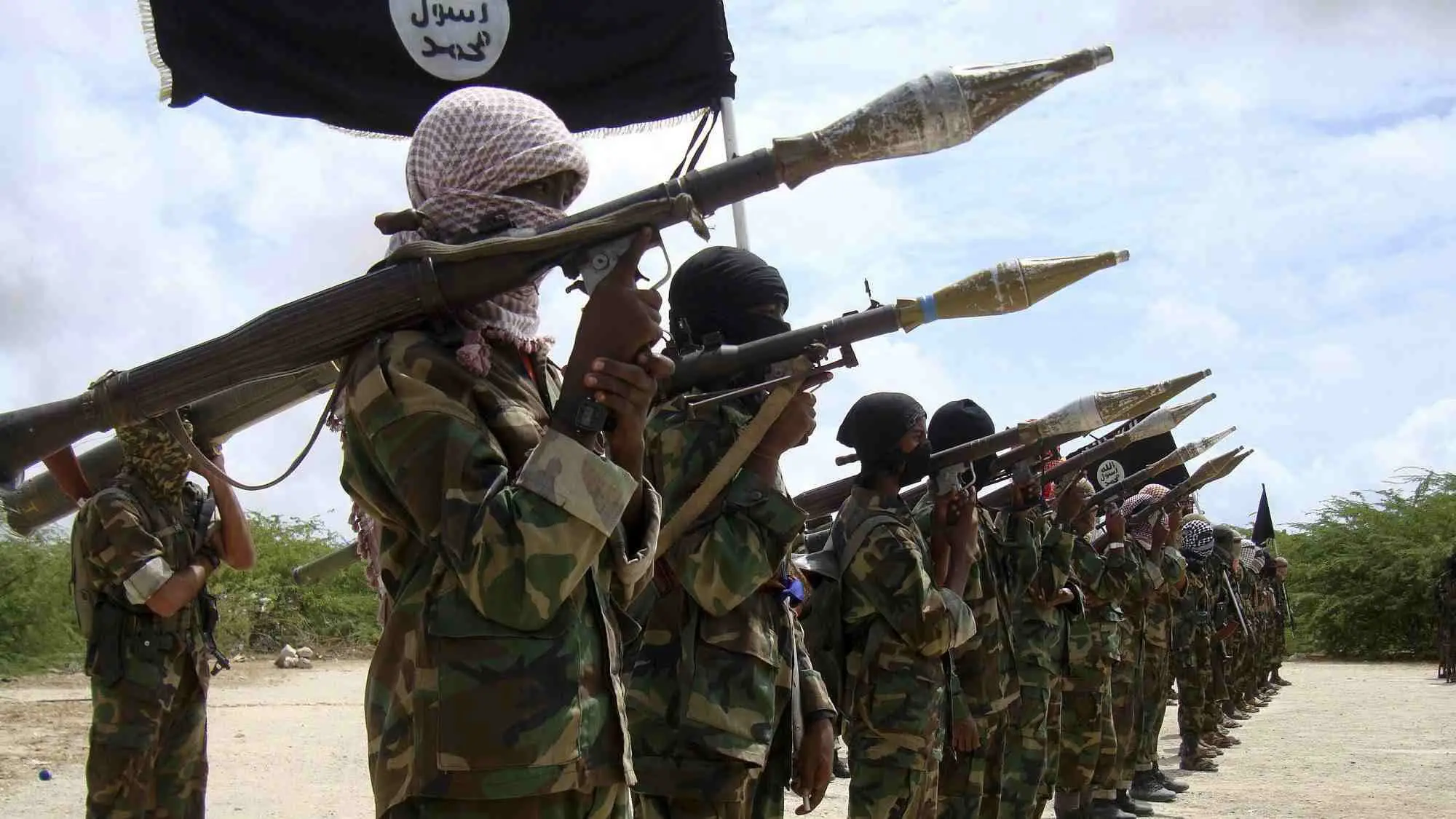Nigeria is experiencing a dangerous and widespread resurgence in bombings since 2024, signalling a renewed crisis of violence across the nation.
This escalation is most pronounced in the Northeast, where terrorist groups like Boko Haram and its splinter faction, ISWAP, have intensified their attacks, notably re-employing suicide bombings—a brutal tactic that had become less frequent between 2018 and 2023.
The return of this deadly strategy is starkly evident in a series of recent incidents. In April 2025, a roadside bomb claimed 26 civilian lives in a village in Borno, and later that month, a female suicide bomber caused at least 12 fatalities at a crowded checkpoint in Maiduguri, marking the city’s first such attack since 2020.
Human rights organisations documented a startling increase in suicide attacks by June 2025, frequently involving women and children who were forced to carry explosives. These incidents reflect a deliberate shift by extremist groups towards targeting vulnerable civilian areas like markets and villages to maximise casualties.
While the Northeast remains the primary hotspot, the threat has spread significantly across the country. In the Northwest, criminal syndicates, commonly known as bandits, have begun using explosive devices for roadside ambushes and raids in states such as Zamfara and Katsina.
Concurrently, bombings linked to separatist movements have been recorded in southeastern states, including Enugu and Imo. This geographical expansion demonstrates a concerning evolution from a localised insurgency to a diffused, nationwide security threat.

The renewed violence carries profound humanitarian and security implications. The Nigerian Army’s “super camp” strategy, which involves consolidating troops in fortified bases, has inadvertently left surrounding rural communities more exposed and vulnerable to attacks.
Furthermore, the increasing sophistication of improvised explosive devices (IEDs) used by ISWAP suggests potential external training or arms smuggling, posing a significant challenge to military counter-operations. For civilians, the deliberate targeting of soft targets like markets, checkpoints, and even displacement camps has fostered a climate of pervasive fear, exacerbating an already dire humanitarian situation.
This new phase of violence marks a dangerous turning point. From 2010 to 2018, Boko Haram’s campaign was characterised by high-fatality attacks and territorial control. The subsequent period, leading up to 2023, saw a decline in suicide bombings but an increase in raids by ISWAP. The current trend now combines the brutal tactics of the past with a wider geographical scope, indicating a more complex and pervasive threat.
Addressing this escalating cycle of violence demands a comprehensive, multi-faceted approach. Security analysts recommend a strategic shift from static military encampments to more mobile units capable of protecting vulnerable rural areas.
Enhanced drone surveillance and stronger intelligence-sharing with neighbouring countries in the Lake Chad Basin are also critical to curbing the cross-border movement of terrorists and other armed groups.
However, any lasting solution must also delve into the root causes of the conflict, such as the profound poverty and widespread unemployment that continue to fuel recruitment into these armed groups. Without an urgent and comprehensive strategic reassessment, Nigeria’s security crisis is poised to become even deadlier.
Table: Bombings in Nigeria (2010 – 23 June 2025)
| Date | LGA/Community | State | Actor | Fatalities |
|---|---|---|---|---|
| December 2010 | Jos South | Plateau | Boko Haram | 80 |
| August 2011 | Abuja Municipal | FCT | Boko Haram | 21 |
| April 2012 | Kaduna North | Kaduna | Boko Haram | 40 |
| April 2014 | Nyanya | FCT | Boko Haram | 75 |
| February 2015 | Baga | Borno | Boko Haram | 100 |
| June 2016 | Maiduguri | Borno | ISWAP | 15 |
| December 2017 | Konduga | Borno | Boko Haram | 4 |
| February 2018 | Konduga | Borno | Boko Haram | 22 |
| July 2018 | Konduga | Borno | Boko Haram | 7 |
| January 2023 | Okene | Kogi | Bandits | 12 |
| March 2024 | Gusau | Zamfara | Bandits | 25 |
| April 2024 | Enugu East | Enugu | IPOB | 8 |
| May 2024 | Damaturu | Yobe | ISWAP | 10 |
| July 2024 | Konduga | Borno | Boko Haram | 19 |
| January 2025 | Biu | Borno | ISWAP | 18 |
| January 2025 | Konduga | Borno | Boko Haram | 2 |
| January 2025 | Giwa | Kaduna | Bandits | 23 |
| January 2025 | Gwoza | Borno | ISWAP | 14 |
| February 2025 | Birnin Gwari | Kaduna | Bandits | 14 |
| February 2025 | Oru East | Imo | IPOB | 7 |
| February 2025 | Batsari | Katsina | Bandits | 9 |
| March 2025 | Ohafia | Abia | Unknown Gunmen | 6 |
| March 2025 | Ogoja | Cross River | Unknown Gunmen | 7 |
| March 2025 | Konduga | Borno | ISWAP | 20 |
| March 2025 | Sabon Birni | Sokoto | Bandits | 12 |
| April 2025 | Potiskum | Yobe | ISWAP | 12 |
| April 2025 | Ukum | Benue | Fulani Militia | 8 |
| April 2025 | Okigwe | Imo | IPOB | 5 |
| May 2025 | Chibok | Borno | ISWAP | 9 |
| May 2025 | Zurmi | Zamfara | Bandits | 13 |
| June 2025 | Jibia | Katsina | Bandits | 16 |
| June 2025 | Damboa | Borno | ISWAP | 15 |
| June 2025 | Konduga | Borno | Boko Haram | 10 |


 Trending
Trending 
